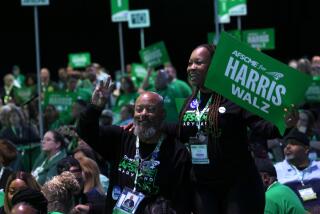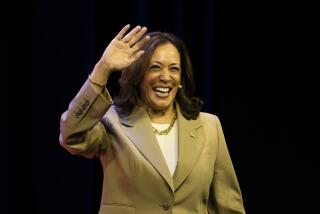Poll Finds Strong Support for Clinton : Transition: The public shows some skepticism, however, on whether he can keep his promises or accomplish his goals.
- Share via
WASHINGTON — President-elect Bill Clinton enters his inaugural week with a wave of public support but also considerable skepticism about his willingness to stick to his campaign promises or his ability to accomplish his goals, according to a new survey to be released today.
Clinton’s public image, which was mixed at best during much of last year, has grown more favorable since the election and now stands at 71% favorable, 20% unfavorable--the highest rating for a President-elect in 30 years of inaugural-month polls.
Asked if they approve of the way he has handled his transition, 84% of the voters surveyed said yes, with only 8% saying no. Among those who approved were 70% of those who voted for President Bush in November and 80% of those who voted for Ross Perot.
By contrast, only 57% of voters surveyed at this point four years ago said they approved of President-elect George Bush’s handling of the transition, and 39% disapproved.
But as the bipartisan team who conducted the survey noted, such ratings often have proven evanescent. For example, the second-highest pre-inaugural favorable rating belongs to Jimmy Carter.
The poll, which surveyed 1,000 registered voters nationwide on Jan. 4 and 5, is the last in a series during the election year by Republican pollster Ed Goeas and Democratic pollster Celinda Lake. The results have a margin of error of 3.1%.
Although Clinton’s popularity is high--and has rubbed off on the Democratic Party--the poll revealed some early signs of potential trouble. Already, for example, 58% of voters have started to believe that Clinton “has had to back off of numerous commitments that he made during the course of the campaign.” Only 30% of voters believed that he had not had to do so.
Only 13% thought that Clinton will be able to accomplish “a lot” of the goals he set for himself in the next four years. The bulk of voters, 56%, said they expect that Clinton will be able to accomplish “some” of his agenda in four years, but 28% said he will not be able to accomplish much. Not surprisingly, people who voted for Clinton were most optimistic about his ability to accomplish his goals, and those who voted for President Bush were most pessimistic.
As has been true in other polls, voters overwhelmingly rated the economy as the most important issue for the new President, with fixing the health care system a strong but distant second.
The survey also showed that reducing the federal deficit has become increasingly important in voters’ minds. A substantial majority of voters, 62%, said that, based on what they have heard, they support Clinton’s programs. But asked if they would still support him if his plans would increase the deficit, only 35% said yes, and 57% said no.
Clinton from time to time has talked of offering an economic stimulus plan that would increase the deficit in the short term, but he has muted such talk recently and, instead, has pledged an effort toward long-term deficit reduction.
Clinton’s campaign to portray himself as a “different Democrat” appears to have paid off for himself and his party. Nearly two-thirds of voters said they see Clinton as a “different brand of Democrat.” Asked about the party itself, 68% said they see it as a “changing Democrat Party,” and only 24% said they see the same party.
Voters by large margins rate Clinton and the Democrats in Congress as more able than the Republicans to handle the nation’s major domestic problems. But the Republicans maintain a large margin on issues of national defense and foreign policy, reflecting voters’ doubts about Democrats in general--and Clinton in particular--in those areas.
Overall, the survey showed that Americans have grown more optimistic in their view of the country’s prospects and their own personal finances. Notably, however, Californians remained considerably more pessimistic than other Americans.
Nationally, 35% of voters said the country is on the right track and 51% said the country is headed in the wrong direction, reflecting in part most Americans’ belief that the country is in a recession. In California, 58% of those surveyed said the country still is headed the wrong way.
More to Read
Get the L.A. Times Politics newsletter
Deeply reported insights into legislation, politics and policy from Sacramento, Washington and beyond. In your inbox twice per week.
You may occasionally receive promotional content from the Los Angeles Times.









